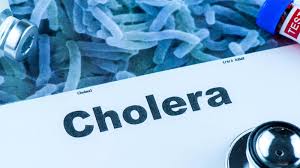Cholera is not new to Nigeria. For decades, this waterborne disease has haunted poor and vulnerable communities, resurfacing with deadly regularity whenever sanitation collapses or clean water is out of reach. In 2025, the pattern has repeated itself yet again. Despite decades of warnings, billions in health budgets, and countless promises from officials, cholera is still here, killing and displacing Nigerians.
The year began with grim statistics. The Nigeria Centre for Disease Control (NCDC) gave a stunning report that suspected cholera cases spiked by 250 per cent within the first five weeks of 2025 compared with previous years. Bayelsa, Rivers, Delta, and Bauchi led the early surge. While mortality figures initially seemed modest, the sheer volume of cases raised alarms. By April, more than 1,300 suspected cases and 34 deaths had been recorded across 30 states, with the spread touching nearly 100 local government areas. These numbers represent homes disrupted, children lost, and communities left vulnerable to further collapse.
By mid-year, the epidemic’s grip had tightened. The nationwide tally jumped to over 3,000 suspected cases and 86 deaths. Zamfara, a state already plagued by insecurity and displacement, alone accounted for 1,619 suspected cases.
Incidentally, September delivered the deadliest chapter yet. In Bauchi State, a cholera outbreak tore through 14 of its 20 local government areas, infecting at least 528 people and killing 58 by mid-month. Contaminated water sources, poor hygiene, and overcrowded conditions created the perfect breeding ground.
Nigeria may not be alone as the global context adds another layer of shame. Across 31 countries in 2025, cholera has infected over 400,000 people and killed nearly 5,000. The World Health Organisation (WHO) says 98 per cent of the burden falls on Africa, the Middle East, and Asia, with Nigeria firmly on the list. Africa’s case fatality rate now sits at 2.2 per cent, higher than the global average, reflecting weak healthcare systems.
The WHO has stepped in, as it always does, supplying cholera kits, training health workers, and urging governments to invest in water, sanitation, and hygiene (WASH) systems. Yet Nigeria seems content to lean on external interventions rather than invest in lasting infrastructure. In the country, boreholes dry up, water treatment plants rot, and communities still drink from streams laced with faecal matter. In Bauchi, for instance, many victims reportedly relied on contaminated rivers and shallow wells.
Underlying the statistics are the drivers we ignore: poverty, rapid urbanisation without planning, climate change-induced flooding, and displacement from conflicts. Each factor worsens the other. In IDP camps, overcrowding ensures one infection becomes hundreds. In riverine communities, flooding turns sewage into drinking water. In rural villages, poverty strips families of the means to boil water or buy soap.
It is important to point out that the conversation is not just about public health; it is about governance. A society that cannot guarantee its citizens safe water and sanitation has abdicated its most basic responsibility. Instead of long-term solutions, governments wait until outbreaks explode, then rush to distribute chlorine tablets and preach hand washing.
Social media has amplified the outcry. Nigerians on X (formerly Twitter) have voiced anger over Bauchi’s outbreak, pointing to government neglect and avoidable deaths. Similar frustrations echo from Sudan and Ethiopia, where cholera also rages.
To us, the way forward is clear, but it requires political will. Nigeria must treat WASH as a national emergency, not a side project. This means sustained investment in water infrastructure, proper waste management systems, and public health education embedded into schools and communities. Again, vaccination campaigns should complement, not replace, long-term fixes. State governments must also enforce urban planning laws that prevent overcrowding and contamination in fast-growing cities.
Cholera is preventable. The bacteria responsible for so much grief cannot thrive where water is clean, sanitation is decent, and health systems are responsive. Therefore, the fact that Nigeria still grapples with it in 2025 is a damning indictment of failed priorities. We are not dealing with an incurable disease, but with incurable neglect. What we need now is action to surmount the menace.


